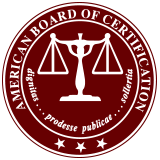Contents
- The Board Certified Bankruptcy Attorney Defined
- How Does a Lawyer Become a Certified Bankruptcy Attorney?
- The Exam Requirement for Board Certification
- Other Requirements for Board Certified Bankruptcy Attorneys
- Do Board Certified Bankruptcy Attorneys Cost More?
- How to Find the Best Bankruptcy Attorney in Detroit (For You)
- Board Certified Bankruptcy Attorneys: The Bottom Line

Walter Metzen is a Board Certified Consumer Bankruptcy Specialist Attorney in Michigan
When you retain a Board Certified Bankruptcy Attorney, you can be sure that you are working with an expert lawyer.
Board Certified Bankruptcy Attorneys will advertise this credential prominently on their websites and in advertising (our firm is no exception!) for this reason.
But what is Board Certification? How does a Michigan lawyer become a Board Certified Bankruptcy Attorney? Most importantly, is it a guarantee of quality?
This Article will discuss the process and testing requirements for Bankruptcy Board Certification. It will also explore the question of how to find the right Michigan bankruptcy attorney for your needs—whether or not that lawyer is Board Certified or not.
The Board Certified Bankruptcy Attorney Defined
A Board Certified Bankruptcy Attorney is a legal professional who has passed a rigorous certification process. There are different Board Certifications for other areas of legal practice. The Board Certified Bankruptcy Attorney has been recognized as an expert in the field of bankruptcy law by the American Board of Certification.
The American Board of Certification is an independent, non-profit organization sponsored by the American Bar Association (“ABI”). Its goal is to encourage and develop expertise among attorneys throughout the United States.
To that end, this organization has established a rigorous standard that must be met by any Michigan attorney seeking Board Certification. Additionally, it requires that interested lawyers pass a detailed examination to prove their expertise.
The American Board of Certification offers separate bankruptcy certification programs in the following sub-specializations:
- Business bankruptcy;
- Consumer bankruptcy;
- Creditors’ rights law.
Thus, if you are a Metro Detroit consumer seeking relief from debt through Chapter 7 or Chapter 13 bankruptcy, you will want to seek out a Board Certified Bankruptcy Attorney with a consumer bankruptcy focus.
A lawyer specializing in “creditors’ rights law” is the opposite sort of lawyer you need, regardless of whether that person is a Board Certified Bankruptcy Attorney or not.
How Does a Lawyer Become a Certified Bankruptcy Attorney?
To obtain Board Certification, a Michigan attorney must, first, meet the eligibility standards laid down by the American Board of Certification.
What is this Board Certification standard? It requires:
- That the bankruptcy attorney have been continuously practicing law for at least 5 years;
- That the attorney is properly licensed to practice law and an active Bar member in Michigan or another state, or the District of Columbia;
- That the attorney remains in “good standing” with the Michigan Bar and all other Bars in which the lawyer is a member;
- That the lawyer have “professional integrity” (i.e., no undisclosed grievance or malpractice complaints or criminal convictions);
- That the lawyer has devoted at least 30% of his or her practice and least 400 hours to bankruptcy during each of the prior 3 years;
- That, for consumer bankruptcy Certification, the lawyer has participated in at least 30 adversary proceedings or contested matters (litigation) in cases involving individual (non-corporate) debtors—with no more than 5 of any individual type.
What sort of adversary proceedings or contested matters are there in Chapter 7 or Chapter 13 bankruptcy cases?
There are only so many “types,” but they include:
- 2nd mortgage lien stripping (removal);
- Secured debt Chapter 13 “cramdowns”;
- Motions to compel abandonment of assets;
- Judicial lien removal motions;
- Chapter 13 claim objections;
- Motions to determine dischargeability of debts;
- Motions for contempt or sanctions;
- Motions to redeem property in Chapter 7 bankruptcy;
- Motions to lift or extend the Automatic Stay;
- Motions to modify a Chapter 13 Plan;
- Motions to reopen a closed bankruptcy case;
- And others.
To have participated in at least 5 of these different types of contested matter disputes will require that a Michigan bankruptcy attorney have practiced for a sufficient amount of time to encounter the factual circumstances giving rise to these disputes.
Time equals experience.
Further, the Board Certification standard requires that the attorney have participated in at least 60 hours of Continuing Legal Education in bankruptcy over the prior 36 months.
Finally, the attorney must provided 9 references from lawyers familiar with his or her competence and qualification. 4 of the referrals must come from bankruptcy lawyers. 5 must come from attorneys who have, themselves, handed a bankruptcy case against the attorney within the prior 3 years.
The Exam Requirement for Board Certification
Second, a Michigan bankruptcy attorney must also pass the Board’s written exam. This test is divided into 3 parts:
- A multiple-choice bankruptcy section;
- A professional ethics section;
- And a section specific to the area of specialization (i.e., consumer bankruptcy law or creditors’ rights law).
The attorney must pass all 3 parts to become a Board Certified Bankruptcy Attorney.
Other Requirements for Board Certified Bankruptcy Attorneys
Once a Michigan bankruptcy attorney is Board Certified, he or she must continually maintain the standard described above.
This includes maintaining “good standing” with all Bar Associations, completing Continuing Legal Education courses—and paying a “recertification” fee as required.
Failing to maintain these and other requirements will cause an attorney to lose his or her Board Certification.
Is It Important to Retain a Board Certified Bankruptcy Attorney?

Walter Metzen is a Board Certified Bankruptcy Attorney in Michigan with over 30 years experience.
There are many fine, highly skilled, highly experienced bankruptcy attorneys in Michigan who are not Board Certified. A lack of Board Certification is by no means any indication that you have not retained an attorney who is more than qualified to handle your Michigan Chapter 7 or Chapter 13 bankruptcy case.
However, retaining a Board Certified Bankruptcy Attorney assures you that your lawyer has the knowledge, experience, and qualifications to handle your case.
When you retain a Board Certified Bankruptcy Attorney, you know that you are working with a lawyer who has been vetted by the American Board of Certification. This is means that you don’t need to worry about whether the attorney has the knowledge to navigate the complex laws and regulations associated with bankruptcy. It assures you that your Michigan lawyer has all the experience necessary to guide you through a difficult decision—and a difficult legal process.
Do Board Certified Bankruptcy Attorneys Cost More?
Board Certified Bankruptcy Attorneys do not necessarily cost more than any other consumer bankruptcy lawyer in Metro Detroit.
This may be the best news of all regarding Board Certification.
That said, a Board Certified Bankruptcy Attorney will be allowed by Bankruptcy Court judges to bill at a higher hourly rate in Chapter 13 and adversary matters. (In bankruptcy, all attorney fees must be disclosed to and approved by the Court.) This will be all the more true because a Board Certified Bankruptcy Attorney is likely to have practiced for a lengthier period of time than non-Certified attorneys may have. Experience in practice also supports a higher hourly billing rate in the eyes of Bankruptcy Court judges.
Nevertheless, Board Certified Bankruptcy Attorneys are subject to market forces and competitive billing just as any other attorney is.
As consumer bankruptcy attorneys, we understand that our clients value every dollar spent in the effort to free themselves from debt. Board Certified Bankruptcy Attorneys want to provide good value to their clients as any other attorney must as well.
However, as ever, you get what you pay for. If your case involves business ownership, real estate, active litigation, high value assets, large tax debts, an ongoing foreclosure process, student loan debt, or anything else posing a degree of complication over the “usual” Chapter or Chapter 13 bankruptcy case, that higher hourly billing rate is itself representative of good value.
How to Find the Best Bankruptcy Attorney in Detroit (For You)
So, when seeking a bankruptcy attorney in Metro Detroit, should you simply look for those who are Board Certified Bankruptcy Attorneys?
You could do worse than to take that approach. However, no single credential should ever overly impress you.
Instead, it is important that you shop for service as well as experience, Board Certification, office location, and, certainly, price. (Low price is the absolute worst reason to hire a lawyer of any sort!)
When speaking with a bankruptcy attorney, it’s important to ask about their qualifications, experience, and the specifics of the services they provide. Some specific questions you may want to ask include:
- Are you a Board Certified Bankruptcy Attorney?
- How long have you been practicing bankruptcy law?
- What types of bankruptcies do you specialize in (e.g. Chapter 7, Chapter 13)?
- What is the process for filing for bankruptcy?
- What are the costs associated with filing for bankruptcy?
- How will bankruptcy affect my credit score?
- Will you be the attorney handling my case or will it be passed off to someone else?
- Do you use appearance attorneys at hearing, or will you appear personally to represent me?
- How will you keep me updated on the progress of my case?
- Are there any alternative options to bankruptcy that I should consider?
- Can you provide references or testimonials from previous clients?
It’s important to feel comfortable with your attorney and confident in their ability to help you navigate the bankruptcy process.
It’s even more important to ensure that you are retaining a law firm that values customer service and client communication as a priority concern.
Board Certified Bankruptcy Attorneys: The Bottom Line
The bottom line is that hiring a bankruptcy attorney can be confusing. In the Metro Detroit area of Michigan, there are dozens, if not hundreds, of bankruptcy attorneys advertising their services.
However, the Board Certified Bankruptcy Attorney credential can simplify your search. While it should not define your entire decision-making process, Board Certification ensures that the lawyer you thinking of hiring has been evaluated by an independent third party organization with no stake in the outcome of your legal proceeding.
Attorney Walter Metzen is a Board Certified Bankruptcy Expert who has successfully assisted thousands of Metro Detroit Chapter 7 and Chapter 13 clients for over 30 years.
If you are considering bankruptcy but aren’t sure whether it is the right path for you, contact us to schedule a free, no-obligation consultation.




